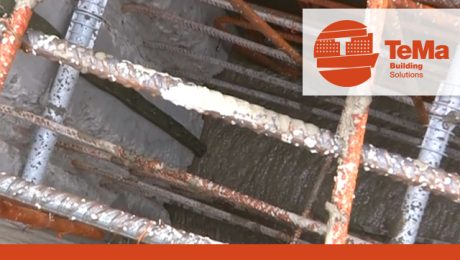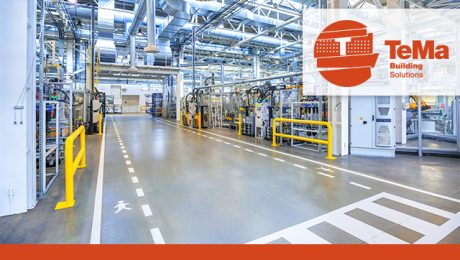Waterproofing when concrete casting
Concrete casting involves creating a new concrete element as a continuation of an already existing one. Most often it’s impossible to create a monolithic block with a single casting: consider, for example, very large structures or the connection between vertical and horizontal walls. With concrete casting you can obtain monolithic structures with their own characteristics, built in stages at subsequent times. So, you proceed with small blocks and join each casting to the previous one, creating a monolith piece by piece.
Structural connection is achieved by using reinforcing irons, taking special care with drilling the existing block and the length of anchorage. While ensuring attachment to the sequence of blocks, reinforcing irons are potential lines for water seepage. We well know that accumulation of moisture in walls may have very severe consequences: structural fragility and very unhealthy stains and moulds.
An effective solution is to insert bentonite kerbs which waterproof any voids that may have formed at the base of walls or in contact with reinforcing irons. The intrinsic property of sodium bentonite is exploited, which is the ability to swell on contact with water, filling the available space and forming an impermeable compound.
Furthermore, this material provides high resistance to hydraulic load, is easily applied and adheres perfectly to the support.
The range of building products from TeMa Building Solutions also includes T-Bentostop, the waterstop made of hydro-expanding bentonite for waterproofing and sealing concrete casting.
- Published in BUILDING, Concrete paving, Foundation and underground structures - Systems for Waterproofing
Concrete industrial paving: How to ensure versatility and durability
A factory layout determines the physical positioning of machines, workstations that develop individual processes and service departments in order to make the work of people, machines and materials more efficient.
Paving is subjected to continuous stress and have to withstand considerable loads. Concrete has its own characteristics to meet these needs and is also very aesthetically versatile, which means that it’s often used by designers in domestic and commercial contexts, both indoors and outdoors. Moreover, it can be quickly customised with textures or other types of printing.
What functions are important in industrial contexts?
Industrial paving inevitably suffers wear and tear from prolonged and intensive use.
It is therefore necessary to guarantee high compressive strength. This is because the surfaces of environments such as warehouses and industrial facilities are constantly subject to heavy loads: storage shelving systems, machinery and moving vehicles such as pallet stackers and forklift trucks. In many cases, weights are concentrated more in some places than in others (e.g. the areas where pallet stackers move or the quintals of goods in the warehouse that weigh down on the same spot for a long time).
This can also cause fissures and cracks on the surface that would hinder access and make it difficult to carry out normal work activities.
Lastly, as already mentioned, concrete is a very versatile material that can be laid over other types of substrate and also customised as required.
How to achieve an optimum and long-lasting result?
Thorough planning from the outset and the choice of suitable materials is the first step to a successful result, but painstaking attention during laying is also important.
The product range from TeMa Building Solutions includes specific products for the reinforcement of this type of paving. T-Fiberglas CLS mesh, made of fiberglass and coated with a special alkaline dressing, is designed to reinforce horizontal concrete applications, whereas T-Zink Net is the anti-cracking mesh made of galvanised steel.
- Published in BUILDING, Concrete paving



